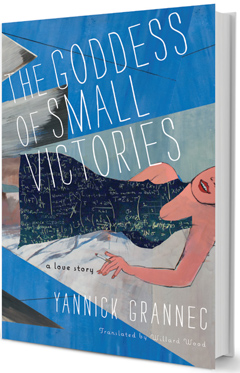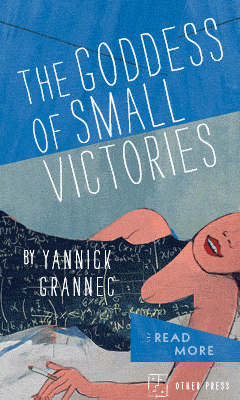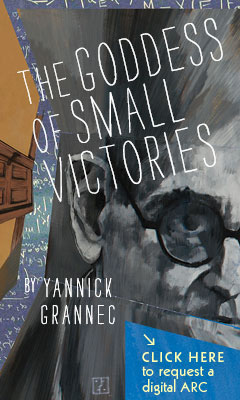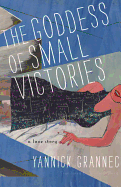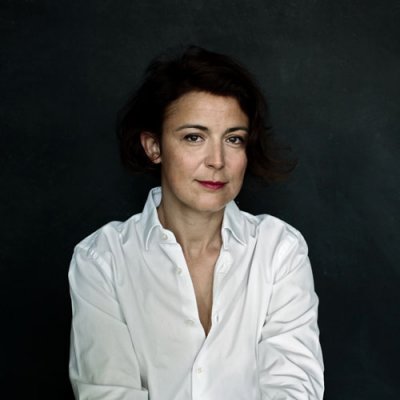The Goddess of Small Victories
by Yannick Grannec, trans. by Willard Wood
Kurt Gödel was a mathematician, logician and philosopher, best known for his incompleteness theorem, and often referred to as one of the greatest logicians since Aristotle. Born in Austria in 1906, he immigrated to the United States in 1940 to escape Hitler's growing power and to pursue his scholarly work. Plagued by mental illness but also highly accomplished in his field, he would easily make an interesting subject to pursue. But Yannick Grannec's first novel, The Goddess of Small Victories, is not about Kurt Gödel; it is about his wife, Adele.
Adele was six years older than Kurt, and was employed as a dancer at a cabaret when they met in 1927. They were a couple for more than a decade (during which time she nursed him through several rounds of institutionalization) before they married, with the continuing disapproval of his family. Adele would face rejection and isolation in the academic community as well, particularly when the couple finally settled at Princeton, where he worked at the Princeton Institute for Advanced Study (IAS).
These details are a matter of historical record. Grannec's foray into fiction begins with her other protagonist: it is 1980, Gödel has recently died of anorexia, and Anna Roth, an employee at the IAS, has been tasked with recovering Gödel's archives from his widow. Adele lives in a nursing home, and continues to hold a grudge against the academic establishment that shunned her; she is known to be a prickly old woman, and at first lives up to her reputation. But she sees something she recognizes in Anna, the daughter of two egomaniacal Princeton professors, who never felt that she fit into that society, being a more timid sort. Gradually, as Anna makes regular visits to the nursing home, the two women begin to open up to one another. Adele calls it a trade: she'll tell her story if Anna tells hers. Chapters of The Goddess of Small Victories alternate between a third-person view of Anna's visits to Adele in 1980, and a first-person telling of Adele's story as it happened chronologically, beginning in 1928.
In this way, "the younger woman" (as Anna is often labeled) gets to visit Adele's past worlds: Vienna in the 1930's, postwar Princeton, McCarthyism, the Cold War; the difficulties of being an immigrant with poor English, the thrill of close friendship with Einstein and other luminaries and, centrally, the challenge of marriage to a tortured genius. Gödel is concerned with the infinite, but unable to handle the minutiae of his life: he is a consistently and increasingly troubled man--gifted, but also cold and demanding. He suffers from depression and paranoia, starves himself, meticulously tracks his body temperature and bowel activity, and refuses to see anyone outside a small circle that includes Einstein, Oskar Morgenstern, Robert Oppenheimer and their wives. He harangues his friends with conspiracy theories and an insistent rehashing of his unpopular notions. These few individuals naturally compose Adele's entire social world, as well. Gödel tests Adele mightily, but in the end her love persists, as does her belief in infinity (a popular topic in the Gödel marriage and within their intellectual circle).
In exchange, Adele enjoys hearing about Anna's life, though it has been marked by broken relationships and fear. The elder woman is outspoken, where the younger is reticent; Adele is enlivened by the challenge of spicing up Anna's professional and love lives. Anna, as it turns out, has had a gifted-but-troubled mathematician in her own life as well. As the book and the women's relationship unfold, the reader's perspective moves more deeply inside Adele's head, hearing her more intimate thoughts and becoming privy to her fears and insecurities, which increase as she ages and her marriage disappoints her. Anna and Adele make a journey together, and soon Gödel's archives are no longer the point (except for Anna's employer).
In an author's note at the end, Grannec succinctly outlines which parts of the story are historically confirmed, which are relatively safe conjectures, and which she has created. Sticklers for historical accuracy should be satisfied. The translation from French to English by Willard Wood is smooth, establishing appropriate voices for the two different protagonists, and creating the evolving atmospheres of nervousness, fear and, eventually, desperation that characterize the Gödel household.
In the end, The Goddess of Small Victories delicately evokes both Adele's varied experiences, in historical context, and also Anna's more circumscribed life, which leaves room for future decision-making. While light is shed on the life and work of Kurt Gödel, he takes a backseat to his dynamic wife in Grannec's compassionate telling. The finer technical details of Gödel's work are outlined in narrative form, as Gödel reluctantly tries to tutor Adele, or discusses theories of philosophy with Einstein and the others. (Grannec also inserts footnotes regularly to offer further explanation, or to attribute quotations.) These mathematical and philosophical dialogues, the reader is reminded, are oversimplified; but they are enough to either whet the appetite, or impress upon one the magnitude of Gödel's genius. The stars of this story, however, are two strong and intriguing women, who are stronger together. --Julia Jenkins


